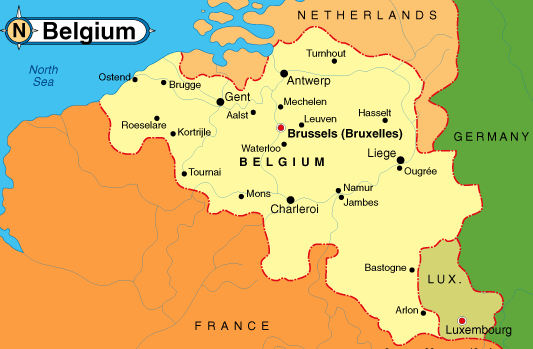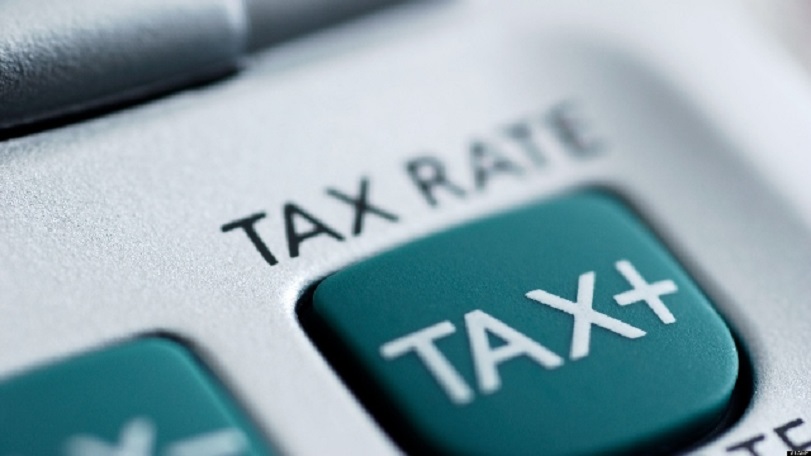General
Belgium Gives €250,000 to Burkina Faso, Mauritania to Fight Terrorism


By Dipo Olowookere
Deputy Prime Minister and Minister of Foreign Affairs Didier Reynders has announced that Belgium will contribute to the prevention of terrorism in the Sahel countries Burkina Faso and Mauritania.
In a statement issued by the Foreign Affairs ministry, it was disclosed that, “Our country donates €250 000 within this context.”
“The funding creates the possibility to give several training sessions in the fields of research- and investigative techniques, judicial cooperation and the combat against the financial flows of terrorism. The criminal law framework will be empowered and the authorities can anticipate more precisely on the threats of terrorist groups and foreign terrorist fighters in West-Africa.
“In addition to this financial aid, the countries will be able to rely on the expertise of the specialized magistrates of the FPS Justice, which will be working in Nouakchott and Ouagadougou,” Reynders said in the statement.
The statement adds that, “The training will be conducted by the Terrorism Prevention Branch of the United Nations Office on Drugs and Crime (UNODC).
“The UNODC is the UN entity which has the mandate and the expertise to assist countries with the legislative and criminal law aspects of counter-terrorism. UNODC aims at creating a comprehensive approach against criminal acts like terrorism, human trafficking, drug trafficking and other forms of organized crime.
“The initiative is related to the UN-policy about the Sahel region, and is consistent with the action plan of the UN Secretary-general for the prevention of violent extremism, supported by Belgium.”
The statement further said, “Didier Reynders attaches great importance to the prevention of radicalism and violent extremism by building and empowering the rule of law and by having a comprehensive approach with respect for human rights.
“These efforts should contribute to more stability in the migration sensitive region, Sahel. This is decisive for the stability of the African continent. Radicalization, violent extremism and terrorism undermine the prospect of security and development.”
General
NLNG to Replace Vessels in Move Towards Decarbonisation, Sustainability

By Adedapo Adesanya
The Nigerian LNG Limited (NLNG), which produces Nigeria’s Liquified Natural Gas (LNG) and natural gas liquids (NGLs) for export, is planning to replace all its vessels with modern ships within the next decade.
This was disclosed by Mr Nnamdi Anowi, the General Manager of Production, NLNG, during the World Leaders’ Panel session on Tuesday in Berlin, Germany, as part of the 2024 World LNG Summit and Awards.
Speaking at the event themed “Achieving the Balance Between Energy Security and Decarbonisation,” he said the company which was incorporated in 1989 was making plans to boost its vessels to ensure proper transportation of gas for export.
“We are making significant strides in our shipping operations. Over the next 10 years, we aim to transition from our current steam-powered vessels to modern ships.
“Earlier this year, we took a major step by entering into a long-term chapter of our first modern ship Aktoras, and we are already planning to acquire a second ship next year,” he said.
On the critical issue of net zero emissions, Mr Anowi said that NLNG aspires to achieve net zero emissions by 2040.
According to him, this goal is attainable through implementing a combination of solutions that include operational efficiency, natural sinks/offset projects, carbon capture and storage (CCS), net zero expansion, digital solutions and shipping efficiency.
“Our pathway to net zero aligns with Nigeria’s target of reaching net zero by 2060, while many major players in the industry are aiming for 2050.
“We are actively expanding our initiatives in this area, including several low-carbon projects,” he explained.
Regarding Liquefied Petroleum Gas (LPG), Anowi noted that the company had committed 100 per cent of its LPG production (propane and butane) to the Nigerian market.
He pointed out the urgent need for cleaner energy, citing a report that revealed that not less than 100,000 Nigerians died yearly from smoke inhalation caused by cooking with firewood, predominantly affecting women and children.
“This underscores our commitment to sustainability. It’s important to recognise that about 80 per cent of Africans lack access to cleaner energy.
“When discussing sustainability, we can not overlook the necessity of providing energy to these communities,” he added.
He further elaborated on NLNG’s strategy, stating, “Our objective at Nigeria LNG is to maintain safety, enhance capacity, foster growth, and future-proof our business.
“The recent transformation programme includes a rebranding initiative, evidenced by the unveiling of a new logo and the company’s renewed purpose: providing energy for life’s sustainability.
Mr Anowi also noted that NLNG was working diligently to improve its production capacity from 23 million tons to 30 million tons through its Train 7 Project.
“We are actively engaging with stakeholders and the government to ensure our LNG trains are filled by the end of next year,” he said.
On sustainability, Mr Anowi explained that 75 per cent of NLNG’s emissions result from its operations, with the remaining 25 per cent coming from its shipping activities.
He emphasised the importance of measurement, reduction, avoidance and mitigation strategies in their sustainability efforts.
He said that the company was also exploring CCS opportunities through partnerships with the government and other international oil companies.
“We are in the early stages of CCS implementation, assessing potential reservoirs for this purpose,” he said.
In terms of renewable energy, Anowi said that NLNG was investigating solar power projects at its offices in Abuja and Port Harcourt as part of its broader sustainability initiatives.
“We are committed to abatement efforts and are collaborating with experienced private companies to explore carbon credit opportunities.
“We must balance sustainability with affordability and reliability in energy supply.
“The African region must progress at its own pace, prioritising immediate energy needs before addressing long-term sustainability goals,” he explained.
General
National Grid, Mr Ibu Among Top Trending Searches by Nigerians in 2024

By Dipo Olowookere
Many events happened in 2024 in Nigeria but a few shook the nation because of their impact on residents of the country.
According to a report released by Google, the incessant collapse of the national grip, which plunged the nation into darkness, was among trending searches on its platform.
In the report made available to Business Post on Tuesday, the tech giant said this year’s results show a continued interest in the political and economic landscape, with searches related to the US elections, the new national anthem.
“The 2024 Year in Search offers a unique lens into the questions, interests, and conversations that shaped the lives of Nigerians this year.
“From cultural milestones to pressing concerns, these insights reflect how Search continues to be a valuable tool for users to navigate and better understand their world,” the Communications and Public Affairs Manager for Google West Africa, Taiwo Kola-Ogunlade, stated.
Google’s 2024 Year in Search for Nigeria showcased the most popular searches, notable individuals, actors, musicians, topics, questions, and other subjects that captured Nigerians’ attention in the year.
Google’s Year in Search is an annual analysis that reveals the top trending lists and also spotlights what the world searches to see, learn, and do.
The music scene in 2024 was marked by a surge in popularity for artists like Shallipopi and Khaid, who also featured prominently in the overall personalities list. The top trending song was “”I Don’t Care” by Boy Spyce”, followed closely by “Ozeba” and “Commas” by Ayra”. Nigerians also showed a keen interest in understanding the lyrics of various songs, with “Ogechi lyrics”, “Ozeba lyrics”, and “Omemma by Chandler Moore lyrics” leading the searches in the lyrics category.
This year, Nigerians continued to demonstrate a strong interest in entertainment with movies like “A Tribe Called Judah”, “Treasure In The Sky”, and “Damsel” topping the movie charts. The top TV series that captured the interest of Nigerian netizens included “Supacell”, “My Demon”, and “Queen of Tears”. In the culinary world, Nigerians explored diverse recipes with “Pornstar Martini recipe” leading the searches.
Concerns about personal well-being and global events were also reflected in search trends. Questions like “How much is dollar to naira today?”, “How to get perfectly defined curls for African hair?”, and “Who won the US presidential election?” topped the list of queries. Nigerians were curious about the meaning of words like “demure,” “steeze,” and “pet peeves,” turning to Search for answers.
General
Fiscal Responsibility Commission Backs Controversial Tax Reform Bills

By Adedapo Adesanya
The Fiscal Responsibility Commission (FRC) has expressed strong support for the controversial Tax Reform Bills currently before the National Assembly.
The bills, developed by the Presidential Fiscal Policy and Tax Reforms Committee on instruction by President Bola Tinubu, aim to improve fiscal governance, transform public revenue architecture boost economic growth.
The Chairman of the commission, Mr Victor Muruako, expressed the support of the organisation at an interaction with academics and journalists on the sidelines of the Fellowship Lecture and Investiture Ceremony of the Capital Market Academics of Nigeria (CMAN) on Monday in Abuja.
According to a statement by FRC’s Head of Strategic Communications Officer, Mr Bede Anyanwu on Tuesday, the agency revealed that a critical analysis of the bills showed that it does not contain any issue or item that could be said to be skewed to favour any region or section of the country.
“The bills rather create a more equitable distribution of resources amongst Nigeria’s federating states,” Mr Muruako added, noting that the analysis also confirmed that the proposed reforms are designed to benefit all Nigerians, particularly low-income earners and Micro Small and Medium Businesses (MSMBs).
Mr Muruako outlined some of the key benefits of the reforms, including tax relief for low-income earners: individuals earning less than N1.7 million annually will pay less income tax, exemption of tax on small businesses with turnovers below N50 million, and exemption of over 90 per cent of small businesses from profit tax payment.
It was stated that the new bills intend to simplify tax administration in the country and make it more transparent.
Increasing revenue for subnational governments as states and local governments will receive a larger share of VAT revenue, empowering them to provide better public services, and improving ease of doing business, noting that reforms will reduce the administrative burden on businesses and make it easier to comply with tax regulations.
The FRC explained that it is upbeat that the tax relief for low-income earners will enhance savings and capital formation at household levels.
The commission also expressed confidence that given the positive correlation between savings and investment, explaining that the increase in small household investments across the board would lead to improvements in the sustainable growth of the nation’s economy.
He also opined that the reduced tax burden on small businesses would give Micro-Small Medium Enterprises breathing space, and enable them to grow organically, hence contributing to a sustained increase in the nation’s GDP in the near future.
On the recent controversies over the bills, Mr Muruako praised President Tinubu for allowing room for further dialogue, appealing to all stakeholders across geopolitical zones to support the bills because their transformative potentials stand to benefit every Nigerian.
-

 Feature/OPED5 years ago
Feature/OPED5 years agoDavos was Different this year
-
Travel/Tourism8 years ago
Lagos Seals Western Lodge Hotel In Ikorodu
-

 Showbiz2 years ago
Showbiz2 years agoEstranged Lover Releases Videos of Empress Njamah Bathing
-

 Banking6 years ago
Banking6 years agoSort Codes of GTBank Branches in Nigeria
-

 Economy2 years ago
Economy2 years agoSubsidy Removal: CNG at N130 Per Litre Cheaper Than Petrol—IPMAN
-

 Banking2 years ago
Banking2 years agoFirst Bank Announces Planned Downtime
-

 Sports2 years ago
Sports2 years agoHighest Paid Nigerian Footballer – How Much Do Nigerian Footballers Earn
-

 Technology4 years ago
Technology4 years agoHow To Link Your MTN, Airtel, Glo, 9mobile Lines to NIN






















